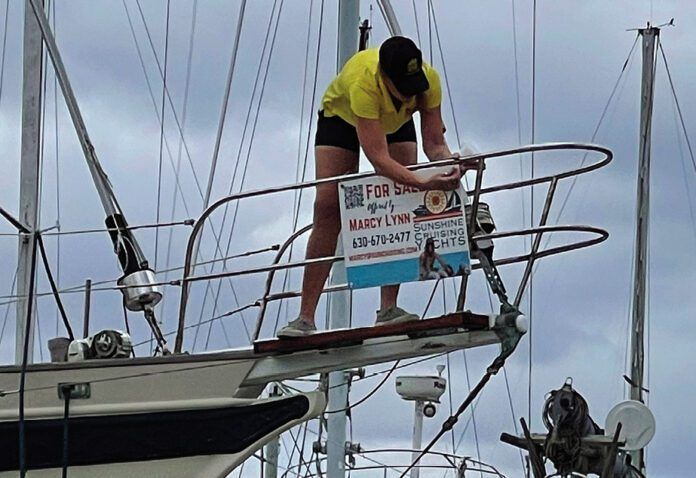Unless the Purchase and Sale Agreement or the Acceptance of Vessel forms specify otherwise, the buyer is responsible for any work that is done to the boat after the closing date, including rigging and splashing. If you are selling privately, it’s important to use the verbiage “as is, where is” in the wording of your contract/agreement even when it is assumed or implied.
Most boat yards include the cost of launch in the initial haulout fee, so even if the seller paid to haul the boat in 2020 and stored her on the hard until selling in 2022, the fee would be covered. However, more yards are moving towards charging separately, especially in a situation where the haul/launch is more complicated than normal (special equipment is needed for an oversized catamaran, a crane or rigger must be hired, etc.).
Even if the launch is covered in the initial haulout fee, the marina will most likely require the new owner to provide a copy of the new insurance policy and a credit card, in case something goes wrong and there is a question of liability.
A good rule of thumb is that, unless it’s specified in writing and signed by both parties before the vessel closes, the buyer assumes responsibility for any costs associated with the boat. If you are a buyer, there are a few things you should do to protect yourself. First, pull a USCG Abstract of Documentation/Title at www.dco.uscg.mil. Don’t close on the boat until you have it in-hand. It will tell you ownership history and, most importantly, whether there are any liens on the boat.
Secondly, speak with the marina where the boat is stored to make sure there are no outstanding bills. If there are, ask the seller to provide you written proof of their payment before closing on the vessel. You can always assume the responsibility but this has to be in writing and part of the deal. This might happen in the case of a seller owing storage fees and the buyer offering to pay them in order for the vessel to be bought at a discounted price.
If you are a seller, you should pay equal attention to the wording in your purchase and sale agreement and make sure the buyer hasn’t altered it in any way and that you have a clear understanding of the terms.
Many boats are sold with a simple handshake, cash, and a signed-over title. This can work, but I’d strongly advise against it. If you do this as a seller, you should check with the state titling agency or the USCG, depending on whether the vessel is documented or titled, to make sure the buyer actually completed the change of ownership. In many states, such as Florida, you can notify the tax collector’s office of a sale. If the buyer fails to register/title the boat and it is then involved in an accident or becomes derelict, you could be hit with heavy fines for a boat you thought you had sold.
Consider using a broker. The broker will make sure you are protected by providing the proper paperwork, holding funds in escrow, and reviewing everything before it is signed. If you choose not to use a broker, you should make absolutely you sure you have a proper Purchase and Sale Agreement and Acceptance of Vessel form signed, and that both parties understand the terms.
And remember that the two best days in a sailor’s life are…












I wish I had seen this article when it first came out as I would have saved myself a lot of heartburn and high blood pressure. Also, I should have used my own broker, the selling broker encouraged the seller to hide major flaws, cheat us on several items and claw back yard bills that had already been paid.
The lessons I learned: buyer beware, don’t trust the seller or selling broker, and have a lawyer or other broker negotiate for you.
100% Agree … I am sure there are ethical brokers out there but from my experience, no matter if you’ve hired “professionals” to look out for your interests, you need to approach every boat purchase with the idea that there is a good possibility that there are purposely undisclosed or hidden issues that will cost you real dollars after the sale is consummated –and it is your job to ferret them out.